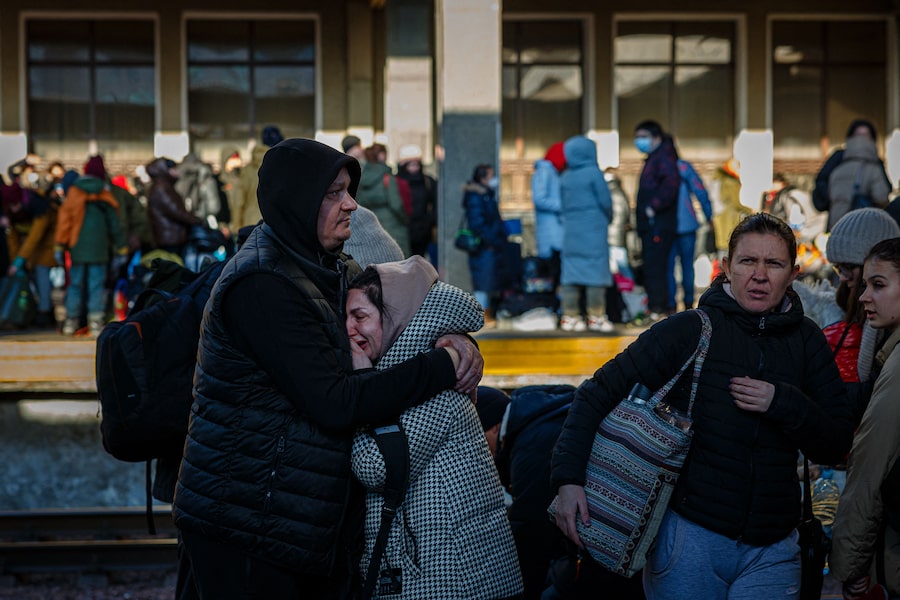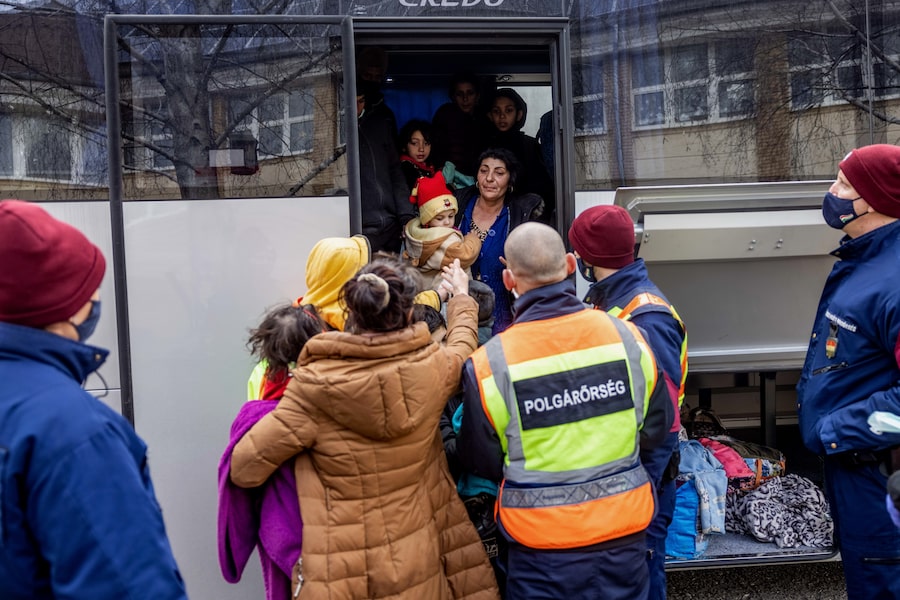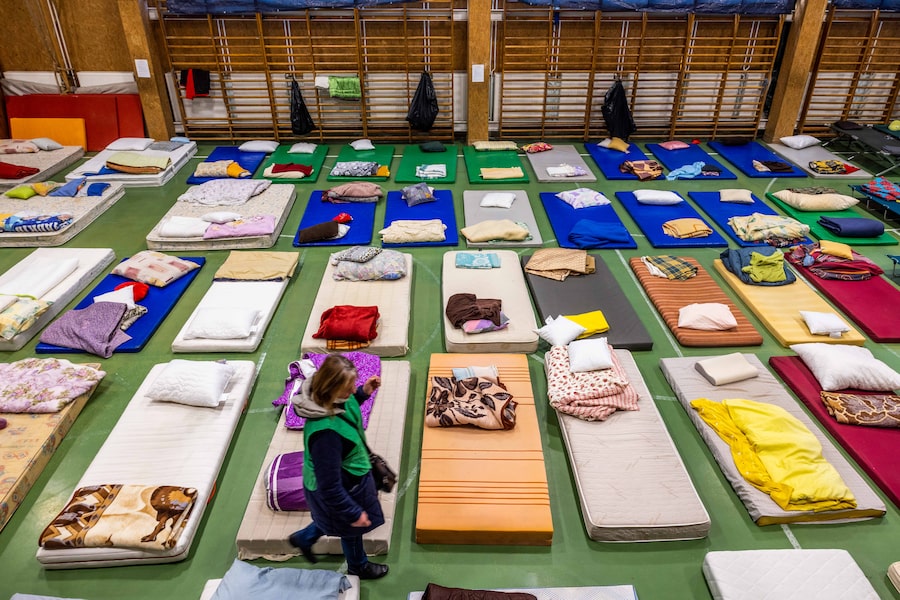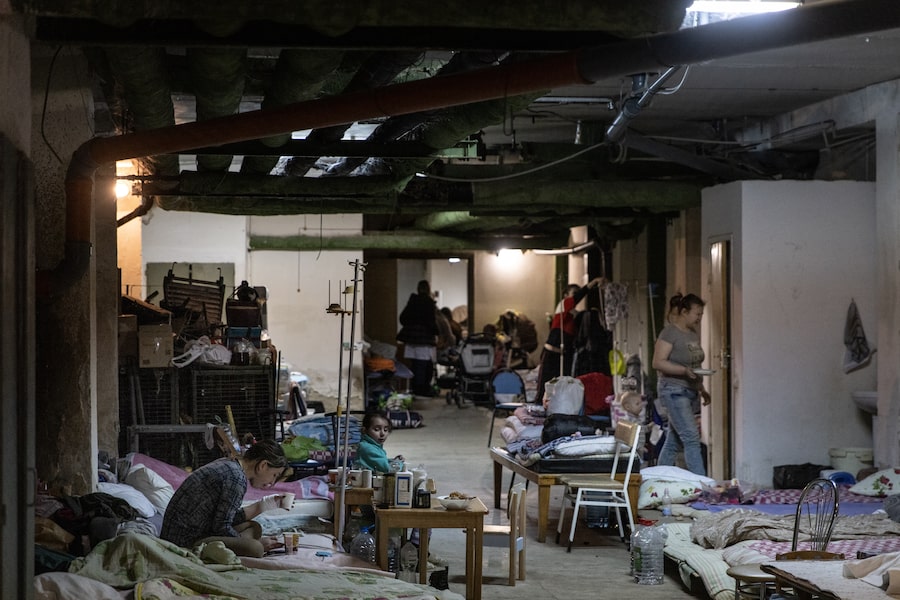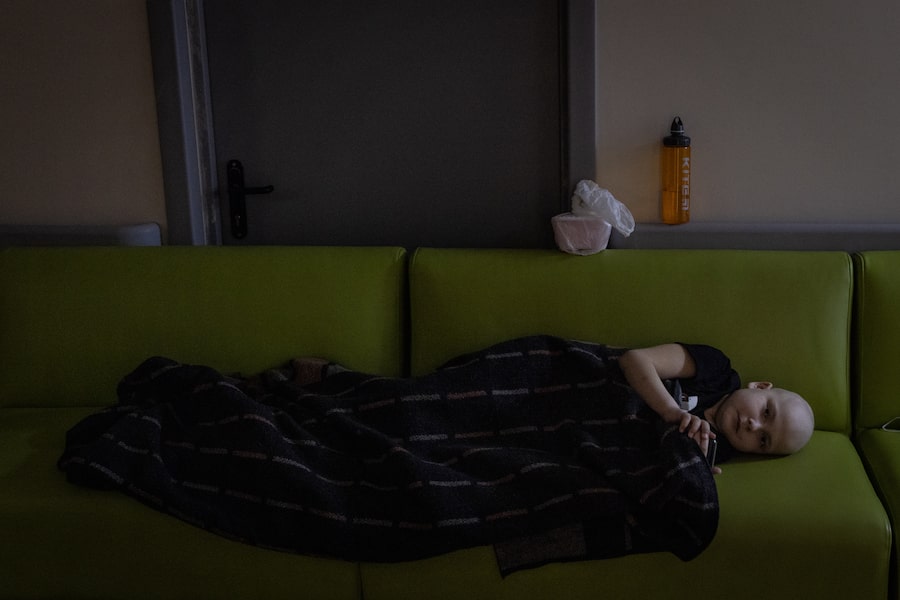This digest has now been archived. Find the latest Russia-Ukraine updates here.
In Kharkiv, Ukraine, a destroyed Ukrainian armoured personnel carrier vehicle is seen in front of a school which, according to local residents, was on fire after shelling on Feb. 28, 2022.VITALIY GNIDYI/Reuters
Russia has invaded Ukraine. Here are the latest updates:
- Kyiv’s mayor, Vitali Klitschko, issued a statement advising residents to spend the night from Monday to Tuesday in basements or bomb shelters as satellite imagery shows a Russian military convoy north of the capital stretching for about 64 kilometres.
- Ukraine’s second-largest city Kharkiv was “massively fired upon” by rockets, killing at least 11 civilians. Ukrainian forces continue to hold Kyiv and Kharkiv, while a Russian news agency reports Russian forces have seized two southeastern city centres, Berdyansk and Enerhodar.
- Western governments have struck Russia with an unprecedented barrage of sanctions, isolating the world’s 11th-largest economy from the global financial system. As a result, Russia is increasingly reliant on China – one of only a few countries willing and able to help.
- Canada will send anti-tank weapons to Ukraine, and is prepared to take refugees from the country if necessary.
- Ceasefire talks between Russian and Ukrainian officials ended at the Belarusian border, with a second round said to be upcoming in the next few days.
It has been five days since Putin launched the Russian assault. Here are The Globe’s compendiums of chronological maps and important photographs, and a continuing explainer about why and how the invasion began.
To learn what you can do for Ukrainians, consult our how-to-help guide. For more updates, visit our list of Globe foreign correspondents and other journalists to follow on Twitter.
10:45 p.m. ET
Ukraine envoy to U.S. says Russia used a vacuum bomb in its invasion
Human rights groups and Ukraine’s ambassador to the United States accused Russia of attacking Ukrainians with cluster bombs and vacuum bombs, weapons that have been condemned by a variety of international organizations.
Amnesty International and Human Rights Watch both said that Russian forces appeared to have used widely banned cluster munitions, with Amnesty accusing them of attacking a preschool in northeastern Ukraine while civilians took shelter inside.
Oksana Markarova, Ukraine’s ambassador to the United States, told reporters after meeting with members of the U.S. Congress that Russia had used a thermobaric weapon, known as a vacuum bomb, in its invasion of her country.
A vacuum bomb, or thermobaric weapon, sucks in oxygen from the surrounding air to generate a high-temperature explosion, typically producing a blast wave of a significantly longer duration than that of a conventional explosive and is capable of vaporizing human bodies.
There has been no official confirmation that thermobaric weapons have been used in the conflict in Ukraine.
- Reuters
10:07 p.m. ET
The Globe’s Mark MacKinnon in Ukraine: ‘The shocking becomes normal in a war zone’
The Globe’s correspondent Mark MacKinnon, who has been covering Kyiv for nearly two decades, shares his experience of having to flee Kyiv as fighter jets screamed overhead and artillery erupted close by.
Monday morning began with hope. For the first time in days it had been possible to have a near-decent night’s sleep at our safe house on the edge of Kyiv. There had been “only” four explosions during the night, my colleagues informed me, and I had slept through three of them. It’s amazing how fast the shocking becomes normal in a war zone.
— Mark MacKinnon
9:49 p.m. ET
Global powers look to calm energy markets
Western countries and OPEC members are preparing to hammer out ways of taming oil prices, which have surged past US$100 a barrel.
So far, the United States and the European Union have avoided restricting imports of Russia’s oil, even though such sanctions are seen as the most effective measure against the Russian economy. Doing so could trigger a painful spike in global oil prices and fuel runaway inflation around the world. Canada announced a ban on Russia’s oil shipments today, but the move is symbolic, because this country has not bought any Russian crude for the past two years.
Today Shell PLC became the latest major oil company to announce plans to jettison billions of dollars worth of Russian energy interests, including its joint venture with Gazprom, which it values at US$3-billion. BP Plc said on the weekend it will drop its 19.75-per-cent share of Russian oil company Rosneft.
The potential for Russian oil and gas sanctions will colour talks on Tuesday when the International Energy Agency holds an emergency meeting to discuss the impact of the Ukraine invasion on global supplies, and how the agency’s members can help stabilize markets.
- Emma Graney, Jeffrey Jones and Adam Radwanski
9:37 p.m. ET
VIDEO: Ukraine asks for immediate EU membership as Russia bombards Kharkiv
8:55 p.m. ET
Kyiv mayor advises residents to seek bomb shelters overnight as satellite images shows Russian convoy north of capital
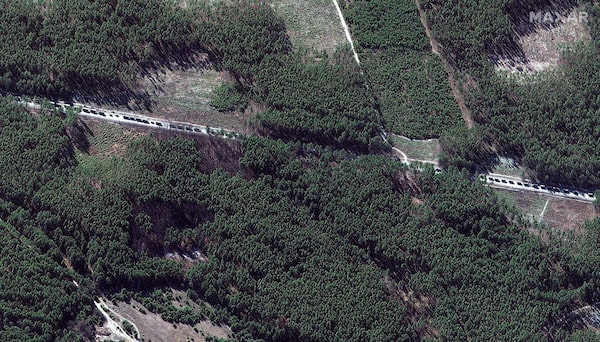
Maxar satellite image taken on Feb. 28, 2022 shows part of a military convoy southeast of Ivankiv, Ukraine.-/AFP/Getty Images
Satellite images taken on Monday show a Russian military convoy north of the Ukrainian capital of Kyiv that stretches for about 64 kilometres, substantially longer than the 27 kilometres reported earlier in the day, a U.S. private company said.
Maxar Technologies also said additional ground forces deployments and ground attack helicopter units were seen in southern Belarus, less than 32 kilometres north of the Ukraine border.
Kyiv’s mayor, Vitali Klitschko, issued a statement advising residents to spend the night from Monday to Tuesday in basements or bomb shelters, if possible. “Tonight will again be difficult,” he wrote.
- The New York Times, Reuters
8:20 p.m. ET
Ottawa warns Canadian businesses of increased threat of Russian cyberattacks
The federal government is warning Canadian businesses and organizations about the increased threat of Russian cyberattacks and malicious software.
Communications Security Establishment, a government agency responsible for signals intelligence and cybersecurity in Canada, said it is monitoring threats directed at infrastructure networks and has been issuing bulletins or public advisories.
“Russia has significant cybercapabilities and a demonstrated history of using them irresponsibly,” CSE spokesperson Ryan Foreman said Monday, adding that Canadian organizations should bolster their online cyberdefences.
CSE would not confirm whether there are any Canadian organizations or businesses that have been affected so far by the war in Ukraine, but said “there has been an historical pattern of cyberattacks on Ukraine having international consequences.”
Last week, the Canadian Centre for Cyber Security sent out a public alert stating it is aware of a new malware called “HermeticWiper” that is targeting Ukrainian organizations. The centre said the malicious software wipes all the data of a company or agency and makes it completely unrecoverable.
7:16 p.m. ET
Trudeau to ask Canada’s broadcast regulator to review RT’s ‘presence on Canadian airwaves’
Prime Minister Justin Trudeau will ask the country’s broadcast regulator to officially review the presence of the Kremlin-controlled news channel RT on Canadian TV, one day after the country’s largest TV providers confirmed they would pull RT from their channel lineups amid Russia’s military offensive against Ukraine.
Bell, Rogers, Telus and Shaw all said on Sunday that they would no longer distribute RT. Also known as Russia Today, the channel was referred to as a “critical” part of “Russia’s disinformation and propaganda ecosystem,” in a U.S. State Department report last month.
RT is included in a list non-Canadian channels authorized for distribution. If it were to be removed from that list, TV providers would not be permitted to carry it in the future.
In his remarks, Mr. Trudeau highlighted “a significant amount of disinformation circulating from Russia, including on social media,” during the crisis.
The Russian embassy in Canada warned that Russia could retaliate with reciprocal countermeasures, but it did not specify what those would be.
- Susan Krashinsky Robertson, Steven Chase
6:35 p.m. ET
S&P 500 ends lower as West hits Russia with sanctions
The S&P 500 ended lower in volatile trading on Monday, with investors wrestling with uncertainty and bank stocks dropping following powerful Western sanctions against Russia as it continued its invasion of Ukraine. The S&P 500 financial index dropped 1.5%.
Canada’s TSX rallied into the close and ended slightly positive for the session. The Nasdaq also ended higher.
Global stocks slumped, the Russian ruble tanked to record lows and safe-haven assets got a boost after Western allies imposed new sanctions that limited Moscow’s ability to deploy its $630 billion foreign reserves and cut off some of its banks from the SWIFT global payments system.
“The Russia-Ukraine invasion in itself is not likely going to be a long-term headwind for U.S. equities. But I think in the short term, it’s a massive contributor to the equity pullback,” said Sylvia Jablonski, chief investment officer at Defiance ETFs.
- Reuters, Globe staff
6:11 p.m. ET
Canada’s Ukrainian restaurants see flood of customers
Some of Canada’s Ukrainian restaurants are seeing a rush of customers amid the ongoing Russian invasion as they look to bounce back from COVID-19 restrictions.
Tetyana Barylko’s family run restaurant and bar Barrel House Korchma in Toronto has been navigating a flood of people wanting to dine-in and order takeout over the past several days. Barylko and her family are stunned by the support the restaurant has received since the crisis in Ukraine began.
But the ongoing supply chain crunch stemming from the pandemic and now the war in Ukraine are making it difficult to buy Ukrainian imports, including non-alcoholic kvass, other beverages and even pickled vegetables. “We were planning on getting beers imported from Ukraine, but I don’t think that’s going to be possible any time soon,” Barylko said.
She expects Ukraine to be more focused on helping its civilians and restoring the country, rather than on exports.
- The Canadian Press
5:37 p.m. ET
Nine civilians killed and dozens of houses destroyed during attack on Kharkiv
As the ceasefire talks between Russian and Ukrainian officials took place in Belarus today, Russian forces unleashed a horrific attack on Kharkiv, Ukraine’s second largest city.
Nine people died, three of them children, the Ukraine parliament said on Telegram. The attacks destroyed 87 houses and injured a further 37 people. “It’s not just a war, it’s the slaughter of the Ukrainian people,” Kharkiv mayor Igor Terekhov said, in comments reported by the parliament.
Kharkiv, which was briefly the Soviet capital of Ukraine, is an eastern city just 40 kilometres from Russia. It briefly fell under Russian control Sunday, before being taken back by Ukrainian forces.
4:26 p.m. ET
Biden, world leaders discuss imposing further ‘severe costs’ on Russia
U.S. President Joe Biden discussed with world leaders during a conference call efforts to further impose “severe costs and consequences” on Russia over its invasion of Ukraine, the White House said.
The White House also said barring Russian flights over the United States is not off the table but there had not been a decision made on the matter.
“No option is off the table,” White House spokesperson Jen Psaki said.
- Reuters
3:59 p.m. ET
Canada will send anti-tank weapons to Ukraine, Trudeau says
Canada is preparing to send anti-tank weapons to Ukraine, Prime Minister Justin Trudeau announced Monday.
Meanwhile, Foreign Affairs Minister Mélanie Joly said Canada is ready to take Ukrainian war refugees if necessary. Joly said Canada has already reached out to neighboring countries, such as Moldova, Romania, Slovakia and Hungary, to offer help with Ukrainian war refugees.
Deputy Prime Minister Chrystia Freeland said Canada is looking at how it can stop imports of Russian oil.
“We agree that oil and gas fund Putin’s war machine and we are working on that,” Freeland said during Question Period.
– Steven Chase and Robert Fife
2:30 p.m. ET
Defiant Snake Island border guards alive – but in Russian captivity
Thirteen border guards on Snake Island who gave a profane rebuke of a Russian war ship are alive, but in Russian captivity.
Ukrainian authorities initially believed the 13 men were killed in a Russian attack on the island. The reason the border guards were presumed dead, Ukraine’s navy said, is that Russian forces “completely destroyed the island’s infrastructure,” including its lighthouse and antennas.
However, Ukraine’s navy has now confirmed that the men are alive, but are in Russian custody. Also in Russian custody are two priests and their assistants who had set sail for the Snake Island to help any victims that may have remained after the Russian attack.
1:26 p.m. ET
Germany prepares for intake of displaced Ukrainians; AirBnB offering to house up to 100,000 refugees
Germany is already preparing for the intake of people displaced from their homes in Ukraine.
However, the government expects that the majority of refugees will find shelter and prefer to be in EU Member States that border Ukraine, said Sascha Lawrenz, a spokesperson for Germany’s ministry of the interior and community.
The situation is still too volatile to estimate the number of Ukrainians who may come through Germany’s borders, Ms. Lawrenz told The Globe. But she added that Germany would be able to deal with “all realistic scenarios” and will support any other EU states that request assistance.
As Ukrainians flee, the non-profit arm of online accommodation booking giant Airbnb has started reaching out to hosts in nearby countries, asking them to take part in a mammoth housing effort.
Airbnb.org says it’s working closely with non-government organizations and other partners to support larger resettlement efforts and offer free, short-term housing to up to 100,000 refugees.
Jennifer Bond, a member of the Airbnb.org board, told The Globe that the foundation is initially reaching out to hosts in Poland, Hungary, Romania and Germany, but expects to broaden that effort in the coming days and weeks as the situation unfolds.
“There will be an immediate, urgent need in those countries immediately surrounding Ukraine, but really this is a global crisis,” she said.
“As Ukrainians start to move into new destinations, our response will be activated in other countries as well.”
The effort builds on a similar program Airbnb.org rolled out recently to help house 20,000 refugees Afghan refugees.
1:21 p.m. ET
Ukraine, allies call for United Nations inquiry into possible Russian war crimes
Ukraine and its allies called for a United Nations inquiry into possible war crimes committed by Russia during its military actions in Ukraine. The UN’s Human Rights Council voted to accept Ukraine’s request to hold an urgent debate on Thursday on Russia’s invasion.
If adopted, a commission of three independent experts would investigate all alleged violations of international law in Crimea and the Donetsk and Luhansk regions since 2014 and in other areas of Ukraine since Russia’s invasion last week.
– The Associated Press
1:19 p.m. ET
FIFA, UEFA suspend Russian teams
FIFA and UEFA have suspended Russia’s team from international football – making it likely the country will be excluded from both the World Cup and women’s Euro 2020 tournament.
Russia were scheduled to host Poland in a World Cup qualifying playoff on March 24 and if they remain suspended at that time, they would be out of the World Cup and unable to progress to the finals in Qatar in November. The only way Russia could still feature in the playoffs would be a sudden improvement in the situation in Ukraine leading to a lifting of the suspension.
“Both Presidents (of the soccer bodies) hope that the situation in Ukraine will improve significantly and rapidly so that football can again be a vector for unity and peace amongst people,” UEFA said.
12:07 p.m. ET
Over 500,000 refugees fled Ukraine since Russia invaded
People from Ukraine get off a bus as they arrive at a refugee shelter, after Russia launched a massive military operation against Ukraine, in Tiszabecs, Hungary, on Feb. 28.BERNADETT SZABO/Reuters
The mass exodus of refugees from Ukraine to the eastern edge of the European Union showed no signs of stopping Monday as they flee Russia’s burgeoning war, with the UN estimating that more than 500,000 people have already escaped.
Long lines of cars and buses were backed up at checkpoints at the borders of Poland, Hungary, Slovakia, Romania and non-EU member Moldova. Others crossed the borders on foot, dragging their possessions away from the war.
Several hundred refugees were gathered at a temporary reception center in the Hungarian border village of Beregsurany, where they awaited transportation to transit hubs that could take them further into Hungary and beyond.
Many of the refugees at the reception center in Beregsurany, as in other border areas in Eastern Europe, are from India, Nigeria and other African countries, and were working or studying in Ukraine when the war broke out.
– The Associated Press
11:28 a.m. ET
Ukraine official says talks with Russia were difficult
Officials from Russia and Ukraine ended peace talks on Monday and will return to their respective capitals for further consultations, RIA news agency quoted Ukrainian presidential adviser Mykhailo Podolyak as saying.
A member of the Ukrainian delegation at ceasefire talks with Russia on Monday said the negotiations were difficult and the Russian side was biased.
“The Russian side, unfortunately, still has a very biased view of the destructive processes it has launched,” Ukrainian presidential adviser Mykhailo Podolyak said on Twitter after attending the talks near the Belarusian border.
-Reuters
11:02 a.m. ET
North American equities slide as sanctions against Russia cause ripple effects into world markets
The Russian ruble tanked to fresh record lows on Monday while world stocks slid and oil prices jumped, all triggered by the West’s increasingly severe sanctions against Russia over its Ukraine invasion.
Russia’s central bank raised its key interest rate to 20 per cent from 9.5 per cent in an emergency move, and authorities told export-focused companies to be ready to sell foreign currency as the ruble slid almost 30 per cent to record lows versus the dollar.
As an economic crisis loomed in Russia, the fallout of tougher sanctions from the West imposed over the weekend rippled out across financial markets.
Canada’s main stock index opened lower on Monday, although gains in commodity-linked stocks limited losses.
At 9:31 a.m. ET, the Toronto Stock Exchange’s S&P/TSX composite index was down 117.13 points, or 0.55 per cent, at 20,988.87.
In New York, the Dow Jones Industrial Average fell 188.13 points, or 0.55 per cent, at the open to 33,870.62.
The S&P 500 opened lower by 30.48 points, or 0.70 per cent, at 4,354.17, while the Nasdaq Composite dropped 123.80 points, or 0.90 per cent, to 13,570.83 at the opening bell.
European stocks were down 1.5 per cent. European banks most exposed to Russia, including Austria’s Raiffeisen Bank, UniCredit and Societe Generale, dropped between 10 and 13 per cent, while the wider euro zone banking index fell 7.1 per cent.
Still, the fall in world stocks was relatively small, with the MSCI world equity index down 0.3 per cent, compared with the 0.6 per cent drop seen last Thursday and 2.4 per cent rebound seen on Friday.
-The Associated Press
9:47 am ET
Ukraine’s second largest city Kharkiv takes onslaught of attacks
Footage from Feb. 28 shows a destroyed clothing factory and damaged military vehicles in Kharkiv, Ukraine after Russian forces attempted to seize the city close to the Russian border. The video was shot by Maria Avdeeva from the European Expert Association, a nonpartisan think-tank dealing with Ukraine’s security and foreign policy.
Kharkiv, Ukraine’s second-largest city, was struck by an onslaught of projectiles, even as a Ukrainian delegation arrived for talks with Russia. Dozens were killed in the attack.
Analysts examining images posted to social media from Kharkiv said they saw evidence of Russian forces deploying cluster munitions into urban areas of the city. Kharkiv, which was briefly the Soviet capital of Ukraine, is an eastern city just 40 kilometres from Russia. It briefly fell under Russian control Sunday, before being taken back by Ukrainian forces.
– Nathan VanderKlippe and Mark MacKinnon
9:10 a.m. ET
U.S. cuts off transactions between Americans and Russia’s central bank in latest round of sanctions
The United States on Monday blocked Americans from engaging in any transactions involving Russia’s central bank, National Wealth Fund and finance ministry in further punishment of Moscow over its invasion of Ukraine.
The fierce economic sanctions imposed by the United States and its allies on Russia’s central bank and other key sources of wealth are likely to drive Russian inflation higher, cripple its purchasing power and drive down investments, U.S. officials said on Monday as the new measures took effect.
The move comes after the United States and its allies last week imposed several rounds of sanctions targeting Moscow, including against Russian President Vladimir Putin and Russia’s largest lenders, after the country’s forces invaded Ukraine.
“This is a vicious feedback loop that’s triggered by Putin’s own choices and accelerated by his own aggression,” a senior U.S. administration official said.
– Reuters
8:48 a.m. ET
The British Petroleum Company’s move to abandon Russia shows disruption to commodities will be profound
BP’s decision to abandon its stake in oil giant Rosneft is the first high-profile example of the self-sanctioning by companies of their business links to Russia, a process likely to have major short- and long-term implications for energy markets.
BP’s dramatic exit of its 19.75 per cent share of Rosneft could cost the London-listed oil major as much as $25 billion, a hefty price to pay in order to be seen to be doing the right thing in response to Russia’s invasion of neighboring Ukraine.
“I have been deeply shocked and saddened by the situation unfolding in Ukraine and my heart goes out to everyone affected. It has caused us to fundamentally rethink BP’s position with Rosneft,” BP Chief Executive Bernard Looney said.
BP’s severing of three decades of ties to Russia puts the pressure on other Western oil majors to reconsider their business links as well.
These include Shell, which owns 27.5 per cent of the Sakhalin-2 liquefied natural gas (LNG) plant on Russia’s Pacific island of Sakhalin, and France’s TotalEnergies, which as a 19.4 per cent stake in Novatek, a 20 per cent interest in the Yamal LNG venture and 21.6 per cent in the Arctic LNG 2 project.
– Reuters
8:20 a.m. ET
Russia imposes sweeping flight bans on airlines from 36 countries
Russia barred airlines from 36 countries including Britain, Germany, Spain, Italy and Canada from using Russian airspace in a retaliatory move after countries around the globe introduced sweeping sanctions targeting Russia’s aviation sector.
– Reuters
7:18 a.m. ET
Tech giants criticized for disseminating disinformation about Ukraine
Google, YouTube, Facebook and Twitter must do more to tackle disinformation related to Russia’s invasion of Ukraine, the premiers of Poland, Lithuania, Latvia and Estonia said.
In a joint letter to the chief executives of the four companies dated Feb. 27, the four prime ministers criticized the U.S. tech giants, saying what they have done so far is inadequate.
“Although the online platforms have undertaken significant efforts to address the Russian government’s unprecedented assault on truth, they have not done enough,” they said in the letter.
“Russia’s disinformation has been tolerated on online platforms for years; they are now an accessory to the criminal war of aggression the Russian government is conducting against Ukraine and the free world.”
They urged the companies to proactively suspend accounts denying, glorifying or justifying wars of aggression, war crimes and crimes against humanity.
– Reuters
7:02 a.m. ET
Zelensky releases prisoners to join fight as Ukraine-Russia talks begin in Belarus
Ukraine’s President is freeing prisoners with military experience to join the battle against invading forces and demanding immediate accession to the European Union, amid signs that international sanctions against Russia were causing economic turmoil.
As fierce fighting continued across Ukraine — whose forces continue to hold Kyiv and Kharkiv — a Ukrainian delegation crossed into Belarus Monday morning for talks with Russia, although Ukraine’s president Volodymyr Zelensky has cautioned that a breakthrough is not expected. Ukraine’s delegation, which includes its Defence Minister but not Mr. Zelensky, is seeking an immediate ceasefire and the withdrawal of Russian troops, according to a statement from the country’s parliament.
Mr. Zelensky said Ukraine will release prisoners with military experience, allowing them to serve sentences “in hot war zones.”
– Nathan VanderKlippe and Mark MacKinnon
5:28 a.m. ET
Cryptocurrency donations pour in for Ukraine
Ukraine’s government has raised cryptocurrency worth almost $13-million after posting appeals on social media for donations of bitcoin and other digital tokens, data from blockchain analysis firm Elliptic showed on Monday.
Ukraine’s official Twitter account made the appeal for cryptocurrency donations on Saturday following the country’s invasion by Russia, posting digital wallets addresses for tokens including bitcoin and ether.
Ukraine’s Vice-Prime Minister Mykhailo Fedorov tweeted the wallet addresses. “Stand with the people of Ukraine. Now accepting cryptocurrency donations,” wrote Fedorov, who is also minister of digital transformation.
By Monday, the wallet addresses had received crypto worth $12.8-million across almost 17,300 donations, London-based Elliptic said. The company tracks the movement of digital coins on the blockchain, a public ledger that records crypto transactions.
Ukraine’s ministry of digital transformation confirmed the tweets were genuine and added: “How will we use money? To destroy as much Russian soldiers as possible.”
– Reuters
5:27 a.m. ET
Talks between Russia, Ukraine begin
Talks between Ukraine and Russia have started at the Belarussian border, Ukrainian presidential advisor Mykhailo Podolyak told Reuters via text message on Monday.
Earlier the Ukrainian president’s office said Ukraine’s goal for the talks was an immediate ceasefire and the withdrawal of Russian forces from Ukraine.
-Reuters
4:25 a.m. ET
Russia doubles interest rates to 20 per cent
Russia’s central bank more than doubled interest rates to 20 per cent to try to protect the collapsing ruble and steady the shaky financial markets as the West’s increasingly tough sanctions began to draw economic blood.
The central bank swung into action before ruble trading was due to start at 10 a.m. Monday Moscow time. In offshore trading, the ruble’s value was indicated as much as 30 per cent lower against the U.S. dollar, setting a new low and putting it into crisis territory.
The previous interest rate was 9.5 per cent. The central bank also temporarily prevented brokers from selling securities held by foreigners.
The pre-opening turmoil delayed the opening of the Russia equity markets. The central bank said it would announce later Monday when trading would resume. Russia’s benchmark Moex index has fallen 30 per cent so far in local currency terms.
-Eric Reguly
3:35 a.m. ET
EU defence ministers to meet to coordinate arms deliveries to Ukraine
European Union defence ministers will meet virtually later on Monday to coordinate their assistance for Ukraine after the bloc decided for the first time to jointly fund weapons and send them to Kyiv, EU foreign policy chief Josep Borrell said on Twitter.
“We will discuss further urgent needs and coordinate our assistance, with help of the clearing house managed by the EU military staff,” Borrell said.
On Sunday, the EU announced it would tighten sanctions on Russia, ban Russian state-owned television network Russia Today and news agency Sputnik and fund weapons for Ukraine to help it defend itself against Russia’s invasion.
– Reuters
3:04 a.m. ET
Ukraine says world’s largest plane damaged
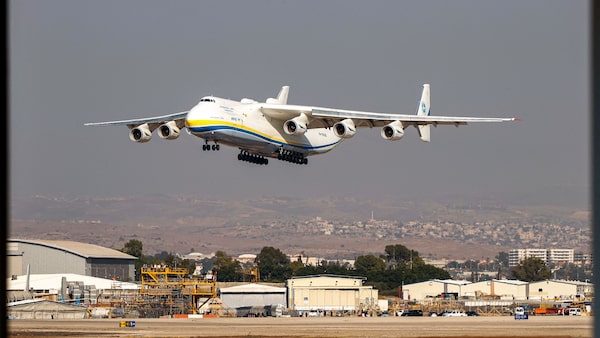
(FILES) This file photo taken on August 03, 2020 shows a view of the Soviet-built Antonov Airlines Antonov An-225 Mriya strategic airlift cargo aircraft, the world's largest cargo plane.JACK GUEZ/AFP/Getty Images
Ukraine’s defense industry conglomerate says the world’s largest plane that was in regular operation was heavily damaged in fighting with Russian troops at the airport outside Kyiv where it was parked.
The Ukroboronprom company said in a statement that the Antonov-225 was “destroyed” but would be repaired. The An-225, which is operated by Ukroboronprom’s subsidiary Antonov Airlines, is used to move exceptionally large cargos. Its arrivals and departures at overseas airports often attract aviation buffs to observe the lumbering plane with a 290-foot (84-meter) wingspan.
Only two planes have been built with larger wingspans — the Stratolaunch and the Hughes “Spruce Goose” — but each was used only for a single flight.
-The Associated Press
2:52 a.m. ET
Vatican says ready to ‘facilitate dialogue’ Russia-Ukraine talks
The Vatican said it was ready to “facilitate dialogue” between Russia and Ukraine to end the war, and called for an immediate stop to the “military attack.”
Secretary of State Cardinal Pietro Parolin, who ranks second only to the pope in the Vatican hierarchy, told Italian newspapers that “despite the war unleashed by Russia against Ukraine” he was “convinced there is always room for negotiations”.
Ukraine’s ambassador to the Vatican, Andriy Yurash, told Reuters in an interview on Feb. 14 that Kyiv was open to a Vatican mediation of its conflict with Russia, calling the Vatican a “very influential, very spiritual place for a meeting”.
Parolin, the Vatican’s top diplomat, told Italian newspapers that dialogue was the only “reasonable and constructive” way to work out differences.
-Reuters
2:26 a.m. ET
UK says Russian advance on Kyiv slowed by staunch Ukrainian resistance
Russia’s advance on Kyiv has been slowed by logistical failures and fierce Ukrainian resistance, Britain’s defence ministry said on Monday.
“The bulk of [President Vladimir] Putin’s ground forces remain more than 30km to the north of Kyiv their advance having been slowed by Ukrainian forces defending Hostomel airfield, a key Russian objective for day one of the conflict,” the ministry said.
“Logistical failures and staunch Ukrainian resistance continue to frustrate the Russian advance.”
Heavy fighting continues around Chernihiv, a city in northern Ukraine, and the northeastern city of Kharkiv, the defence ministry said in an intelligence update posted on Twitter. Both cities remain under Ukrainian control, it said.
-Reuters
1:35 a.m. ET
UK says it will target Russian central bank
Britain said on Monday it was taking further measures against the Russia in concert with the United States, and European Union, prohibiting any British entities from undertaking transactions with the Russian central bank, finance ministry and wealth fund.
“The UK Government will immediately take all necessary steps to bring into effect restrictions to prohibit any UK natural or legal persons from undertaking financial transactions involving the CBR, the Russian National Wealth Fund, and the Ministry of Finance of the Russian Federation,” the government said.
Britain said there would be more designations announced this week.
“These measures demonstrate our determination to apply severe economic sanctions in response to Russia’s invasion of Ukraine,” finance minister Rishi Sunak said.
“The Bank of England continues to take any and all actions needed to support the Government’s response to the Russian invasion of Ukraine,” Bank of England Governor Andrew Bailey said.
-Reuters
12:54 a.m. ET
Russian airline Aeroflot crosses into Canada’s airspace despite ban
Despite Canada’s decision to close its airspace to Russian aircraft, a Russia-bound aircraft crossed into Canadian airspace a few hours later – a mistake that the federal government pinned on the non-profit agency that monitors Canada’s airspace.
Aeroflot 111, which travels between Miami and Moscow, crossed into airspace over Quebec at about 6 p.m.
In a statement, a spokesperson for Mr. Alghabra said that Nav Canada – the privately run, non-profit corporation that monitors air traffic in Canadian airspace – allowed the flight to pass.
“NavCan mistakenly permitted a banned aircraft into Canadian airspace. This shouldn’t have happened,” Valérie Glazer, the spokesperson, said in an e-mailed statement.
Mr. Alghabra will be meeting with its chief executive officer to understand why the flight was permitted entry, she said. “Canadian airspace remains closed to Russian planes.”
(1/2) We are aware that Aeroflot flight 111 violated the prohibition put in place earlier today on Russian flights using Canadian airspace.
— Transport Canada (@Transport_gc) February 28, 2022
In an e-mailed statement, a spokesperson for Nav Canada said that Aeroflot declared that flight 111 was a “humanitarian flight,” as it crossed into Canadian airspace. Such a declaration requires “special handling” by air traffic controllers, Nav Canada’s Jonathan Bagg said in the statement, and after making it, the aircraft continued unimpeded.
Mr. Bagg said Nav Canada will co-operate with Transport Canada’s investigation. The navigation service said it is also working with other countries’ navigation agencies to ensure Russian aircrafts are re-routed before they are near Canadian airspace. In the case of Aeroflot 111, it passed over Maine before flying over Eastern Quebec.
- Greg McArthur and Marieke Walsh
12:30 a.m. ET
IOC, IPC asked to suspend Russia, Belarus
Athletes from Ukraine and other nations have called on the International Olympic Committee to suspend Russia and Belarus and ban their athletes from events immediately.
“Russia’s invasion of Ukraine, supported by Belarus, is a clear breach of the Olympic and Paralympic Charters - a breach that must be met with strong sanctions,” the athletes said in an open letter to IOC president Thomas Bach and International Paralympic Committee chief Andrew Parsons.
The letter, released by the Global Athlete movement, which aims to empower athletes, said that Ukrainian sportspeople and their families in the country were in “grave danger” and it had been a challenge to speak to them as they were in bomb shelters.
It added that refusing to take swift action and suspend the National Olympic Committees of Russia and Belarus would send the wrong message.
“Your lack of action will send a message to every athlete in the world that you have chosen Russia and Belarus interests over athlete interests. Your legacy will be defined by your actions,” the letter said.
The letter received widespread support, including from British former marathon runner Paula Radcliffe and Canadian former cross-country skier Beckie Scott.
The IOC has said international sports federations should either move or cancel sports events currently planned in Russia or Belarus, while the IOC’s executive said Russian and Belarusian national flags should not be displayed at international sports events.
- Reuters
12:23 a.m. ET
Meta says Ukraine’s military, politicians targeted in hacking campaign on Facebook
Meta Platforms said a hacking group used Facebook to target a handful of public figures in Ukraine, including prominent military officials, politicians and a journalist, amid Russia’s ongoing invasion of the country.
Meta said in the last 48 hours it had also separately removed a network of about 40 fake accounts, groups and pages across Facebook and Instagram that operated from Russia and Ukraine targeting people in Ukraine, for violating its rules against coordinated inauthentic behavior.
A Twitter spokesperson said it had also suspended more than a dozen accounts and blocked the sharing of several links for violating its rules against platform manipulation and spam. It said its ongoing investigation indicated the accounts originated in Russia and were attempting to disrupt the public conversation around the conflict in Ukraine.
- Reuters
12:15 a.m. ET
Belarus may join Ukraine invasion, U.S. official says
A senior U.S. intelligence official says Belarus is expected to send troops into Ukraine as soon as Monday to fight alongside Russian forces that invaded Ukraine last week.
Belarus has been providing support for Russia’s war effort, but so far has not taken a direct part in the conflict.
The American official has direct knowledge of current U.S. intelligence assessments and says the decision by Belarus’ leader on whether to bring Belarus further into the war depends on talks between Russia and Ukraine happening in the coming days. The official spoke anonymously to discuss the sensitive information.
Russian forces have encountered strong resistance from Ukraine defenders, and U.S. officials say they believe the invasion has been more difficult, and slower, than the Kremlin envisioned, though that could change as Moscow adapts.
12:00 a.m. ET
Russia restricts access to Facebook
Russia has apparently rendered Facebook largely unusable across leading Russian telecommunications providers amid rising friction between Moscow and the social media platform.
The London-based internet monitor NetBlocks reports that Facebook’s network of content-distribution servers in Russia was so badly restricted Sunday that “content no longer loads, or loads extremely slowly making the platforms unusable.
”Russian telecoms regulator Roskomnadzor on Friday announced plans to “partially restrict” access to Facebook. That same day, Facebook’s head of security policy had said the company was barring Russian state media from running ads or otherwise profiting on its platform anywhere in the world. Facebook says it has also refused a request by the Kremlin not to run fact checks related to Russia’s invasion of Ukraine on the platform for users inside Russia.
- Associated Press
